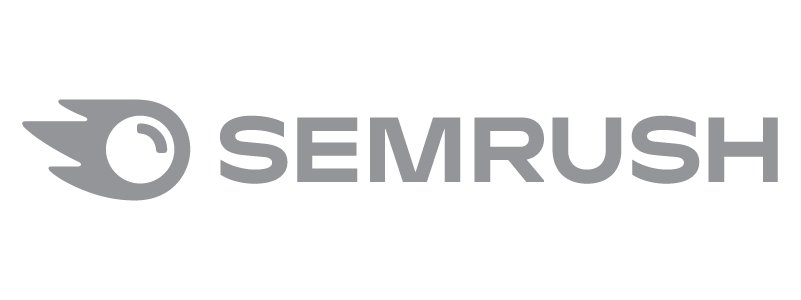AliExpress is a smaller-scale marketplace created by the Alibaba Group. It positions itself to sell products near wholesale to businesses and consumers alike. AliExpress reviews are often mixed, but there is no denying the success and popularity of the platform within its niche.
Some may be wary of buying inexpensive merchandise from overseas. Still, the business model for AliExpress seeks to cut out the go-betweens to offer low prices on the same products that might pop up elsewhere after passing through a few more hands. That isn’t to say AliExpress is without risks or drawbacks, as its direct-to-consumer model puts it in a somewhat awkward spot for other businesses to purchase from.

In this article, we will discuss how ecommerce companies can leverage AliExpress and who can benefit. We’ll also go more in-depth about how AliExpress works and compare it to the largest ecommerce marketplaces like Amazon and Bonanza.
AliExpress Overview
AliExpress.com is a marketplace much like Amazon or eBay. Unlike Amazon, AliExpress doesn’t sell any of its own products; it merely facilitates sales between suppliers and buyers.
Selling on AliExpress is pretty straightforward. You just need to create a seller account by entering some information about your business and choosing a template for your online store. Then you can upload products and set shipping options, and you’re ready to start selling!
For customers, AliExpress isn’t much different than online shopping with Amazon. You can browse all sorts of product categories, visit specific product pages, or even check out individual seller storefronts. To make a purchase, simply add AliExpress products to your cart and checkout!
The main selling point of this B2C marketplace is its very low prices on a wide range of products. Many manufacturers sell their goods directly through AliExpress so that you can take advantage of near-wholesale rates.
While there are many advantages to AliExpress, there are also some drawbacks. Namely, there is less in the way of customer support since products are usually coming from various vendors in China. You may have trouble resolving issues with product quality from the vendor after long shipping times, language barriers, and time zone differences.
History of AliExpress
AliExpress is an internet shopping service founded in China and owned by the Alibaba Group. Established in 2010, the marketplace connects companies based in China and other locations, such as Singapore, with international online shoppers.
AliExpress receives hundreds of millions of visits every month. It is the most popular of all ecommerce sites in Russia and the tenth most frequented website in Brazil. It supports small businesses that sell to consumers all over the world.
AliExpress has been compared to Amazon and eBay, as vendors are independent and use the platform to provide merchandise for purchasers.
How is it Different From Alibaba?
Alibaba is primarily for B2B connections, while AliExpress focuses more on B2C. AliExpress is owned by the same company as Alibaba, making these websites two sides of the same coin.
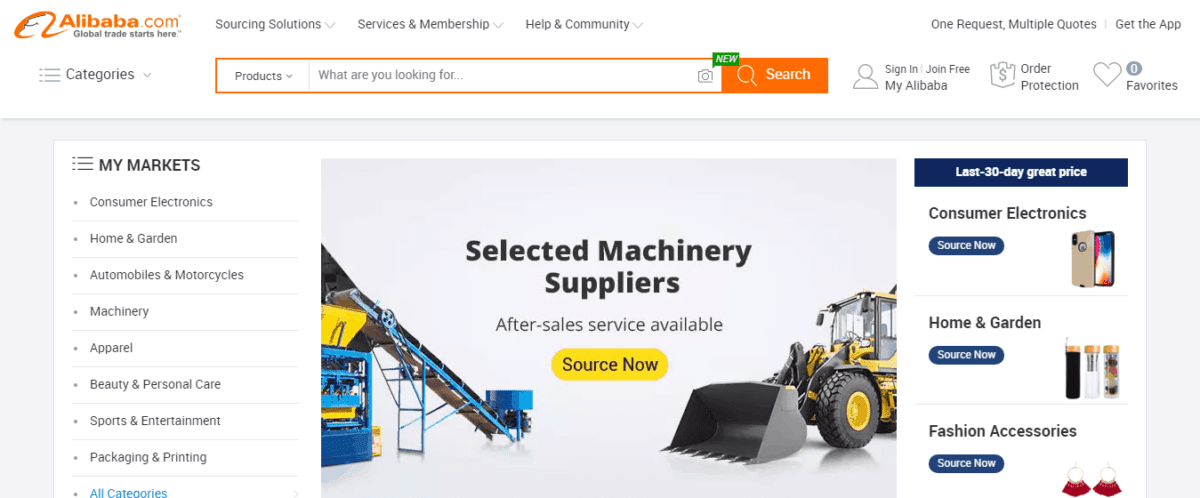
Retailers often use Alibaba to find manufacturers and wholesalers to supply them. These suppliers often sell their products on AliExpress in smaller quantities straight to consumers. In fact, Alibaba.com is less a marketplace where you add products to your cart and purchase them than a directory where you can connect with other businesses overseas.
AliExpress connects suppliers directly with customers and is also effective for a dropshipping business model. Here, customers can browse products from sellers overseas and get them shipped directly. The prices will generally be higher than buying wholesale in bulk but are still very cheap since you are often buying directly from the manufacturer with minimal markup.
Pricing Options
Unlike Alibaba, which heavily focuses on negotiation and bulk pricing, AliExpress generally has set prices. However, these prices are often much lower than retail because they frequently come from overseas suppliers.
AliExpress does a good job simplifying the cost of the products, shipping, and other possible fees, so there are no surprises for buyers. AliExpress has a buyer protection policy, which is helpful for buyers compared to Alibaba where you may need to negotiate prices, shipping terms, import dues, and other contractual agreements on your own.
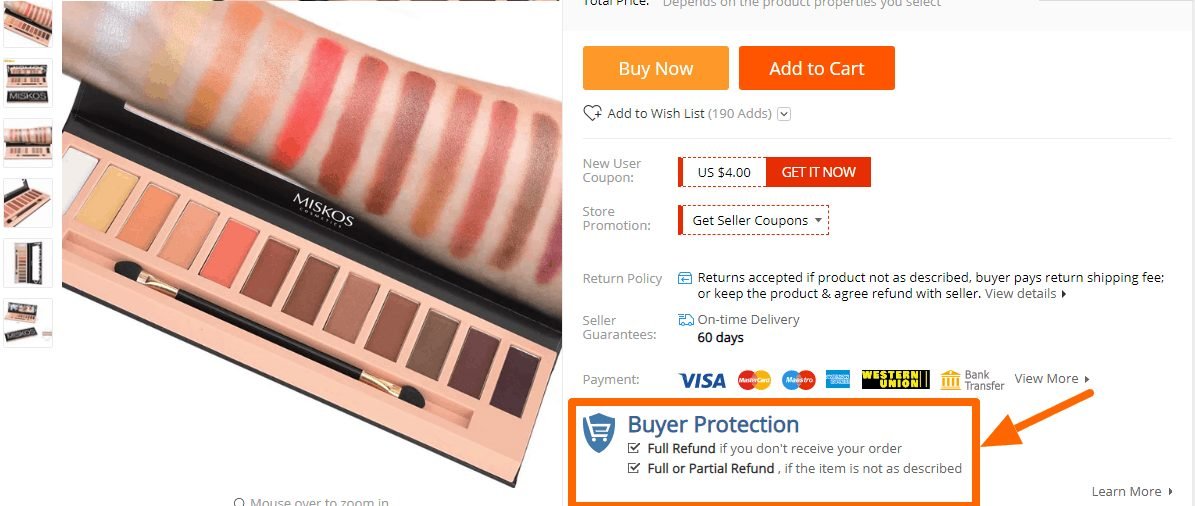
Inevitably, the convenience of AliExpress factors into the price, so you won’t be paying the same rock-bottom prices you would on Alibaba, but for B2C sales, this is unavoidable. Sometimes, you might find bulk order pricing for larger quantity lots. Generally, expect to pay the advertised product listing price per unit and a reasonable shipping charge on each AliExpress purchase.
AliExpress Business Models
There are several different strategies for leveraging AliExpress in the ecommerce world. The marketplace serves a niche between B2B and B2C sales that can work for either in the right situation. Below we cover some popular ecommerce business models that can take advantage of what AliExpress has to offer.
AliExpress Wholesale
While most businesses will choose Alibaba over AliExpress for wholesaling, AliExpress can still be a worthwhile option. You don’t have as much freedom when it comes to negotiation and bulk pricing, but you can still source all sorts of low-cost goods.
If you plan to reorder the same stock again and again, you are probably better off making a direct agreement with the supplier; But if you are only looking to round out your inventory with a selection of different items at affordable prices, AliExpress has a lot to offer. For example, if you run a small boutique with some hangers to fill, you could pop onto AliExpress and shop from a massive selection of beauty products, fashion products, or cheap t-shirts to resell.
Ordering multiple items from the same seller, even in small quantities, can help you save on shipping costs to keep your prices down and margins up. One of the biggest advantages of AliExpress is there are countless items available to order from all sorts of different categories.
Pros
- Huge selection of products
- Lower than retail prices
- No order minimums
Cons
- Less focus on bulk pricing
- Less room for negotiation
- Not quite wholesale pricing
AliExpress for Dropshipping
Dropshipping is another popular strategy on AliExpress because of the wide selection of products and low prices that leave room for healthy margins. As a dropshipper, you essentially find customers interested in a product, then source that item and have it delivered directly to the buyer at a markup. There are two ways AliExpress can be of use for dropship businesses.
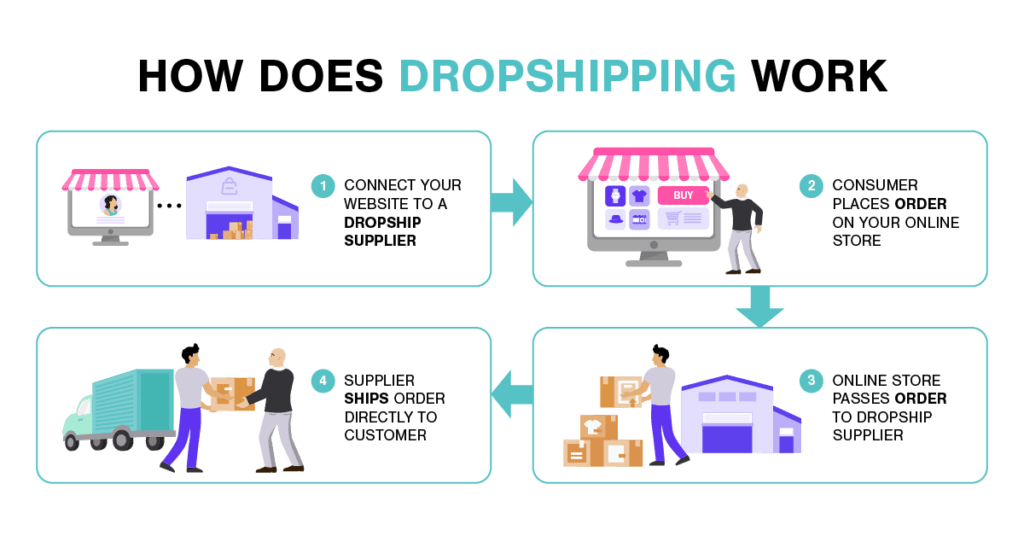
The first method involves using AliExpress as your source. For example, you might sell products on your own website, social media, or through a catalog. The items you offer are available on AliExpress. When a customer purchases one of these items from you, simply order it from AliExpress and have it delivered directly to them.
The second method is to establish an agreement with a supplier to sell their products for them on AliExpress. For this strategy, you actually set up a seller account on AliExpress and create your own storefront. The products you offer on your store are ones from your supplier that you don’t hold a physical inventory of. When someone places an order on AliExpress, you pass the shipping information to your supplier, who handles fulfillment.
Pros
- No product handling
- Simple supply chain
- No need for warehouses
Cons
- No bulk discounts
- Limited control of fulfillment
- Extra step processing orders
AliExpress Private Label
Private labeling is a strategy where companies add their branding to unmarked goods to sell under their name. For example, a shoe manufacturer might produce a particular footwear design without any tags or logos. A retail company then buys those shoes and adds their own tags or logo after the fact to sell as their own.
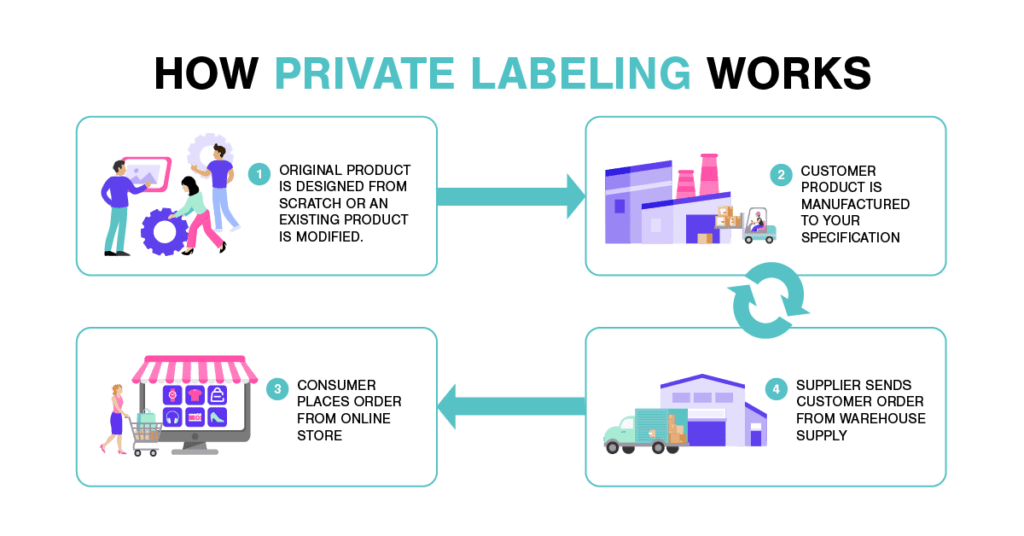
This practice is more common than you might think, with many famous brands having their goods produced by third-company suppliers. Some suppliers on AliExpress even market their products specifically for the private labeling market.
Another common practice is buying unmarked items and repackaging them to match your store or brand. In this case, the product remains the same, and only the packaging contains any branding or label. Again, sourcing these items directly from the manufacturer on Alibaba may make more sense in some cases, but AliExpress can also be used for smaller-scale orders.
Pros
- Massive catalog of products
- Avoid R&D costs
- Small batch sizes
Cons
- Savvy shoppers may notice
- Need labeling solutions
- Limited control of supply chain
Product Quality With AliExpress
Since just about anyone can sell products on AliExpress, the quality of goods will vary from merchant to merchant. AliExpress only facilitates the interaction between buyers and sellers, they do not handle the products themselves or vet them all for quality standards.
However, the merchants usually hope to establish a reputation and sell lots of their products, so selling poor-quality goods with misleading product specifications doesn’t do them any favors, either. You can always check to see whether a merchant is brand new, has a good seller rating, or has any accolades through Ali that they have earned.
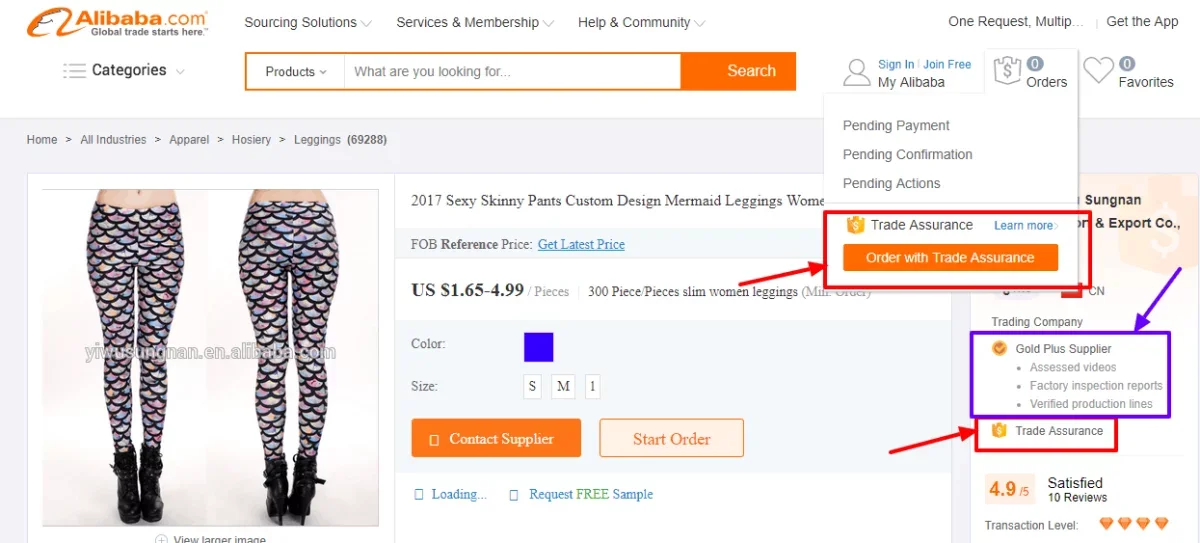
For example, a brand-new storefront with only one item for sale and no customer reviews might be a shell company looking to offload low-quality goods. Similarly, a shop with negative reviews is a red flag you might want to avoid. But if a verified AliExpress merchant has a large selection of goods and a history of healthy product reviews, you shouldn’t have any reason to worry about issues or a scam.
Delivery Quality & Speed
Again, AliExpress does not directly control the shipping of goods sold through their marketplace, so results will vary. There are some guidelines and expectations on behalf of sellers, so for the most part, orders should be delivered within the policy window with contents securely packaged.
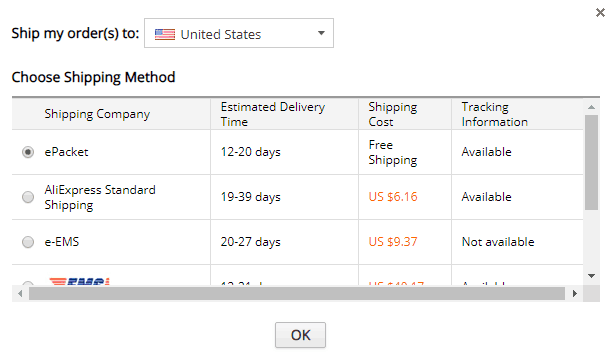
Many AliExpress items ship from overseas, which obviously adds to the cost and timeframe for delivery. Some overseas companies maintain fulfillment centers in different regions to expedite shipping for customers worldwide.
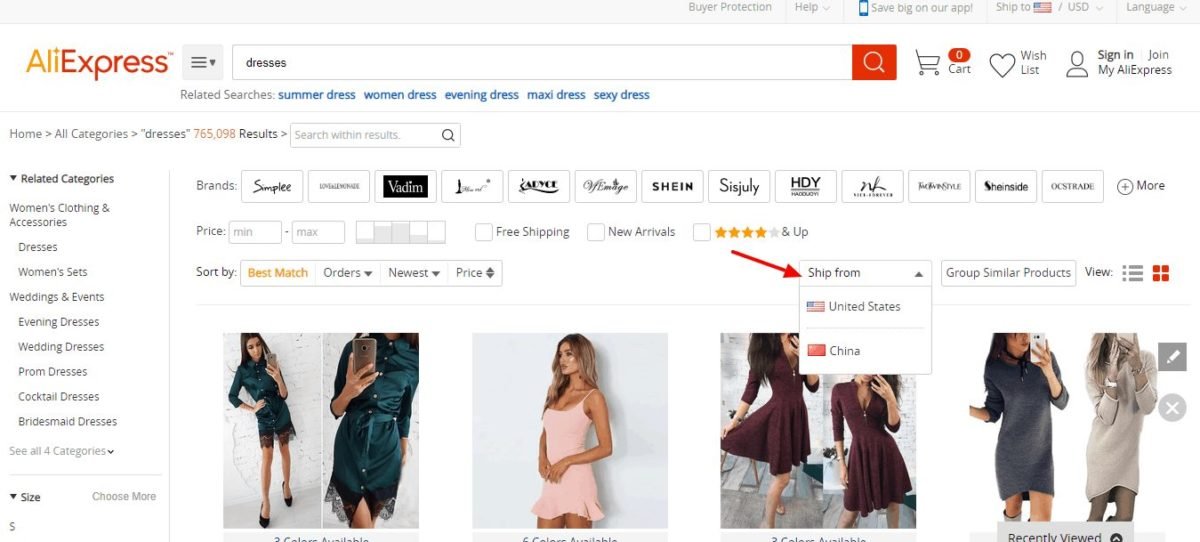
Should any orders you place on AliExpress not arrive in time or in secure packaging, you can open a dispute and hopefully resolve the issue. However, this can be a hassle, and there is no guarantee you will receive a full refund. Don’t get the wrong idea, though; most orders arrive on time and without issue.
Potential Issues With AliExpress
Alternatives for AliExpress
Unlike Alibaba, AliExpress has some popular peers in the industry. While there are some significant differences between them, below you will find other ecommerce marketplaces that offer a similar variety of products from third-party merchants.
eBay
EBay began as an online auction site but has evolved to allow for more standard ecommerce transactions. Items can still be sold in auction format, of course, but many eBay merchants opt for straight sale listings like you would find on Amazon or AliExpress. EBay is a popular option for oversea sellers as it allows them to reach a vast market of buyers on an immensely popular website. You can shop all manner of goods from individuals like yourself (C2C) or many companies and even top retailers who have established a steady presence on the ecommerce platform.
Amazon
Amazon heavily inspired the overall design of AliExpress. Both feature a rotating list of products on the home screen with menu navigation to reach a wide array of different item categories. The main difference between AliExpress and Amazon is that Amazon takes a more active role on its platform. A large portion of items sold on Amazon pass through first-party warehouses for fulfillment. Amazon also sells its own products alongside other vendors and is more directly involved in day-to-day operations and policy enforcement. As a result, expect to pay more for products, but you can also count on better service and lower risk.
Overstock
Overstock has also evolved over the years, transitioning from a discount outlet selling surplus inventory from other brands to its own marketplace. Unlike the other options in this list, Overstock limits its offerings to home goods like furniture and decor. Similar to AliExpress, Overstock offers prices well below retail, thanks to its clever strategy of cornering overstocked products. In addition, merchants can partner with Overstock to sell their goods on the website, assuming they meet the requirements. Especially if you are looking to source large items like furniture (which can be very expensive to ship overseas), Overstock can be a good option. Just don’t expect fantastic prices on everything.
Bonanza
Bonanza is about as pure of an online marketplace as you can find. It doesn’t have the auction functionality of eBay, the fulfillment of Amazon, or direct from manufacturer focus of AliExpress; it’s just a place for sellers to connect with buyers. You’ll find a large variety of products available in both new and used condition. Many of the sellers on Bonanza are just everyday people looking to sell used items, but there is nothing stopping businesses from selling new or bulk products through the platform. Don’t expect wholesale rates, but you never know what you might find from local or overseas sellers on Bonanza.
LightInTheBox
LightInTheBox is the retail successor of MiniInTheBox. This global ecommerce company uses its scale of service and ordering power to source and sell quality products at a great price. Though it offers a wide variety of product categories, it can’t quite compete with the likes of Amazon and AliExpress simply because the company is managing its supply chain, not merely providing a place for other merchants to do business. That said, you can expect high-quality goods and services since all products are backed by LITB, and its ordering power means it can afford to pass on low prices.
MiniInTheBox
A sister site to LITB, MiniInTheBox offers a large selection of products at wholesale prices rather than retail. How? MITB sources goods directly from Chinese manufacturers and then sells them directly to consumers and other businesses. Essentially, MITB serves as the missing middleman of Alibaba or AliExpress. Since the products you buy from MiniInTheBox have to pass through an extra set of hands, expect prices to be slightly higher than if you purchased them directly or in bulk, but the advantages are worth it. MITB has already vetted the products and companies they source, and they also have their reputation on the line if a sale goes awry. If you want the affordability of Chinese wholesale goods with an extra layer of service, check out MiniInTheBox.
FAQs
Is AliExpress Right Ecommerce?
AliExpress is one of the internet’s best-kept secrets. Everyone knows Amazon and eBay, but AliExpress is still catching on for some reason. It’s true that there are more convenient options (Amazon) and better avenues for bulk stock orders (Alibaba), but AliExpress serves a niche somewhere in the middle.
While AliExpress might not be as convenient as some other options in the American market, its prices for some product categories are tough to beat. AliExpress can be an excellent choice for ecommerce companies and consumers alike if you can afford to wait for longer shipping times.
If you still aren’t sold on AliExpress, try it yourself! Browse millions of products from a huge variety of categories and sellers. Chances are you’ll be impressed with the experience, so be sure to share your AliExpress review!






